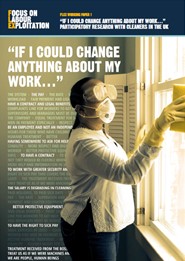This working paper, based on participatory research carried out with cleaners in the UK, highlights key workplace issues in the cleaning sector, and the risk and resilience factors that impact cleaners’ vulnerability to labour abuse and exploitation. It finds that cleaning is a high-risk sector for labour abuse and exploitation, with workers experiencing frequent issues with pay, inability to take time off when ill, and dangerous working conditions, including high levels of sexual harassment – a key form of gender-based violence. It also identifies systemic and structural issues that create risk of labour exploitation, including the fissured nature of the sector, the low presence of union representation, barriers affecting marginalised workers, and the impact of limited labour market enforcement, among others.
This paper provides an important addition to the existing literature on working conditions in the UK cleaning sector through its unique methodology, which involves workers in every stage of the research process, from design to data collection and analysis. This feminist participatory action research approach has enabled workers to shape the research findings and recommendations, including workers who are at high-risk of exploitation but less frequently represented in policy research, such as undocumented migrants, people who do not speak English and/or work long and unsociable hours. By involving workers from some of the most at-risk groups, this report brings the voices of people with lived experience to the forefront and includes their perspectives in the policymaking process. This work is part of an ongoing three-year research project which seeks to address the knowledge gap concerning experiences and drivers of labour abuse and exploitation in understudied low-paid sectors of the economy. More specifically, the study looks into the working conditions of women and young migrant workers with European Economic Area passports in three low-paid and often precarious sectors – cleaning, hospitality, and app-based courier and logistics work in the gig economy.

